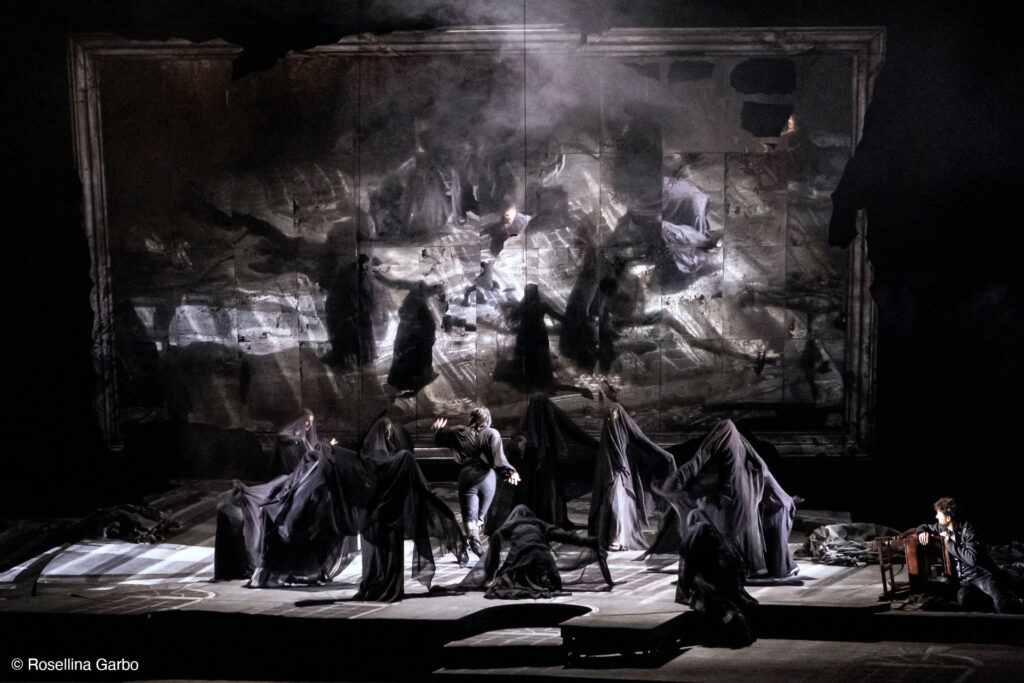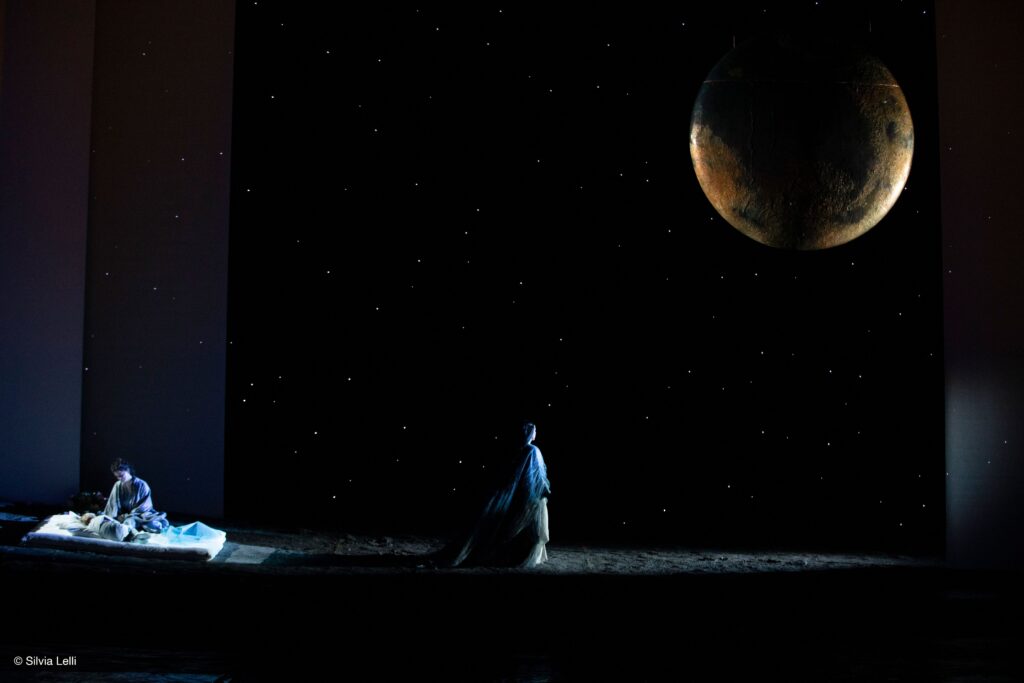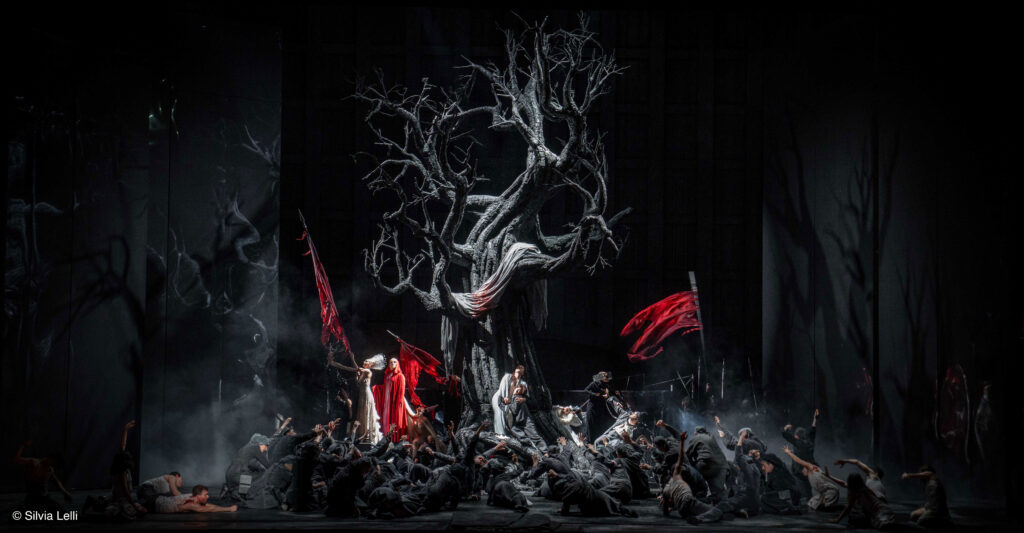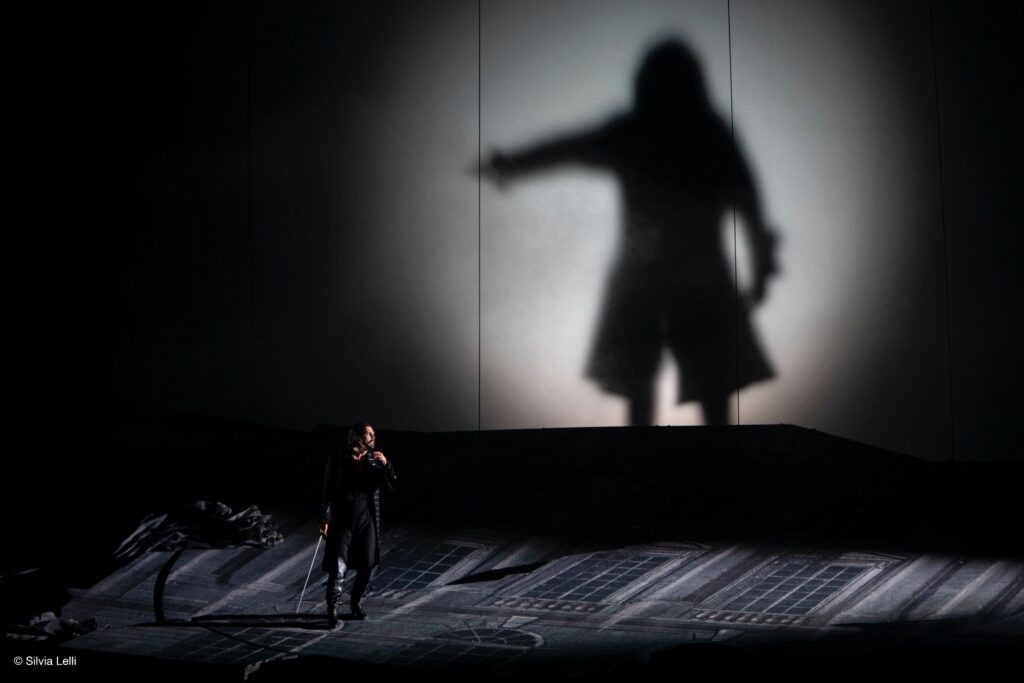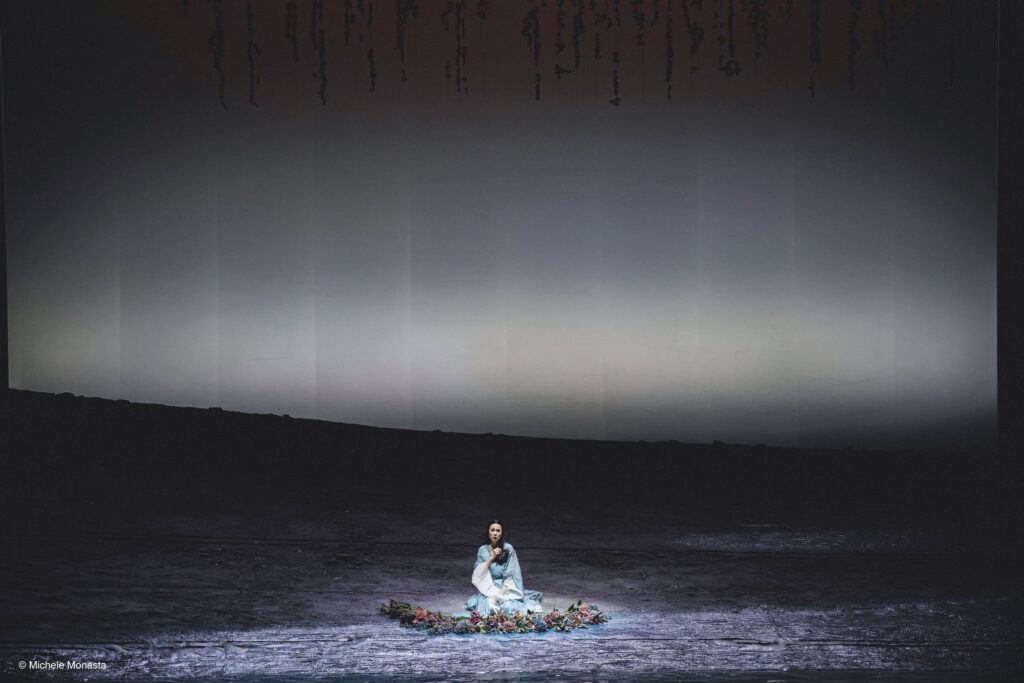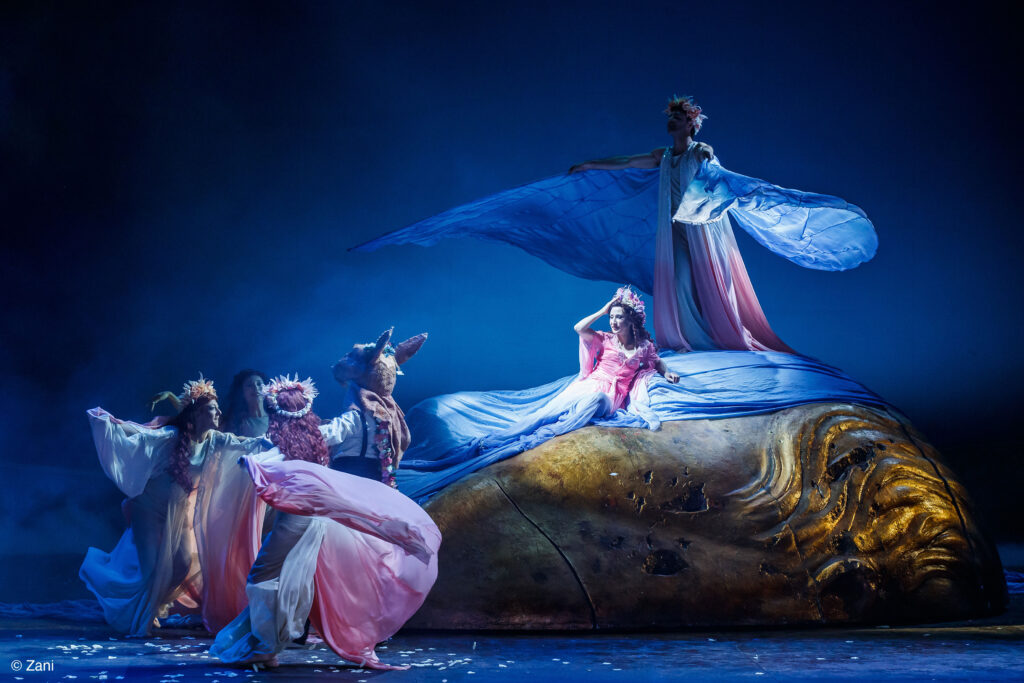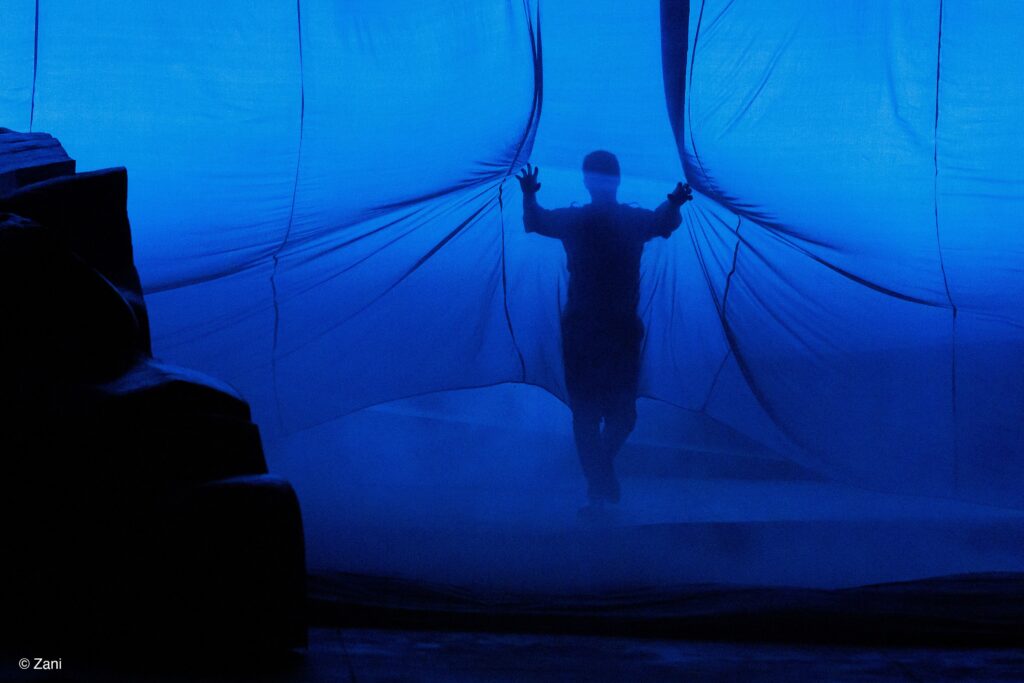There is only one creator
Text by Chiara Muti
To give an image to sounds… to harmonies whose immaculate trace on the score seems, in listening, to reveal glimmers that will inhabit visions lighting up the darkness of the stage.
In Opera, Music is Direction! In the theatre of Spoken Drama, the word, free in time and phrasing, dynamics and colors, waits on paper, to be reinvented. On the musical staff, that freedom is denied…
The word, imprisoned in music, is already, in itself, an interpretation.
To the director falls the daunting task of deciphering the composer’s will…
Farewell, freedom of the spoken stage… The canvas is anything but blank…
When the sublime touches heights beyond our reach, then it is given to us the task not to spoil it, but humbly to restore intact the echo that was a revelation to the one who wrote it.
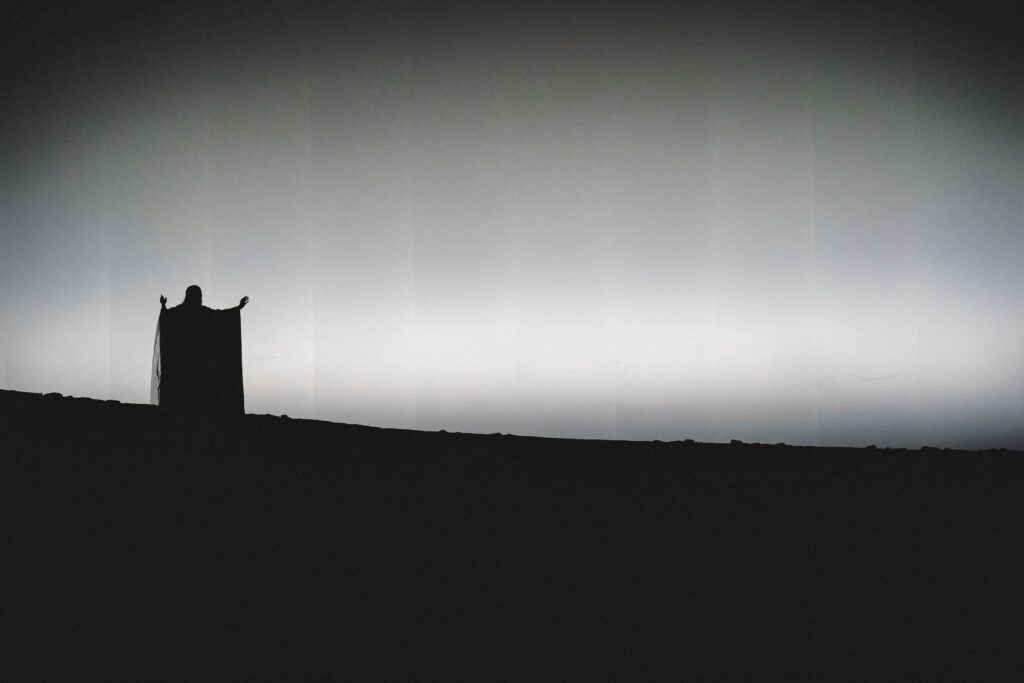
Working on the character
Where do I come from… Where am I going… and why… They sound like existential questions… and indeed, these are the questions every actor or singer must ask themselves when entering and exiting the stage, in that very moment, illuminated by the spotlight and scrutinized by a thousand eyes, inhabited by “necessity,” the beating heart of the meaning behind every action. Working on the psychology of the text and subtext is the foundation of my approach to Theater. Knowing how to build a character’s lived experience, intuiting their key feeling, and defining it through a precise gestural style—depending on the text, the era, and the context in which the work was written—in a harmonious ensemble that involves the entire theatrical machine! Because the time is not the time of one alone, but of all! And if each one dances only for themselves, the performance is lost, because theater is made together! This is why the late arrival of so-called divas to rehearsals can only sow discord, il will, and carelessness, causing the inevitable pollution of a healthy group energy! I was born an actress and work with my singers as an actress. In my view, an actordirector can more deeply help their colleagues on stage find the right interpretation. As a theater actress, I have experienced the profound silence that fills the hall when something magical happens on stage. I have lived it as an actress, as an audience member, and as a director—which is the most uncomfortable position from which to watch the fruit of one’s own labor. I consider it fundamental for a director to be able to stand alongside their performers on stage, showing them with clinical precision the gestures required in the relentless search for the “why” of everything… everyone must clearly understand their sense of becoming on stage and the conflict that grips them with others, and from what depths of contrasts it arises or has matured. For a director, analyzing the libretto corresponds to a musician’s analysis of the score. The director at the opera must also be a musician, and the musician a director. Alongside the spoken text lies the imperceptible and inscrutable emotional subtext corresponding to the music. This is the miracle of Opera! Two emotions—visible and invisible, readable and audible at the same time—often in harmony with the explicit meaning of the words, and often in contrast, testifying to human conflicts, conscious and unconscious, opposing one another to reveal the arcane complexity of the human mask… What other art form can achieve this? Hence, every character on stage can be “one, no one, one hundred thousand,” as Pirandello suggests, delving into the multiple expressions of human relationships, without ever losing sight of the musical fabric, which must not be betrayed or silenced by positions that outrage the deepest essence of the opera’s subject. Words, text, stage, costumes, light… everything must agree in perfect harmony! In spoken theater, the actor has full power over the language score—they are the “master” of their silences, accents, and the rhythm of the phrase, whether broken, suspended, fractured, slid, or accented. In Opera, the “master” is outside of us, precisely between stage and auditorium… and guides the performer, trapping them in a convention that, only if respected, can transcend the language of speech and elevate itself to the language of feeling, surpassing issues of language comprehension. Spoken language becomes universal. Emotion is thus recognizable by all, whether living in Tokyo, New York, Tunis, Madrid, Paris, or Vienna… great operatic heroes survive intact the dialectical curse of the Tower of Babel, which divides peoples and generates misunderstanding. Be careful then not to distort this power of Opera by over-structuring it with intellectualisms, updating and implausible. reinterpretations, and ending up confusing the dialogue between music and word, degrading its prerogatives, in the vain attempt to innovate or, even more humiliating, to “modernize” a language that is already universal by itself! A great sin of pride! The result is the dispersal of energies and the annihilation of the musical discourse. Opera, outraged, folds in on itself, in a nonsense between the unconscious subtext and the conscious text… brutalizing it, wearing it out, and thus, truly, making it out of time…
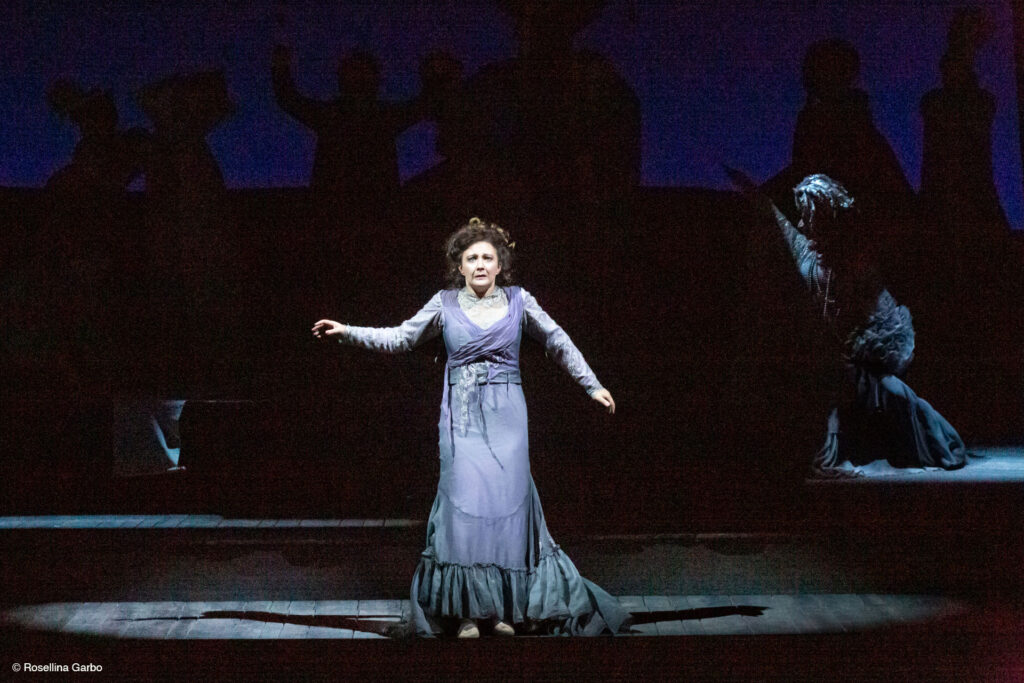
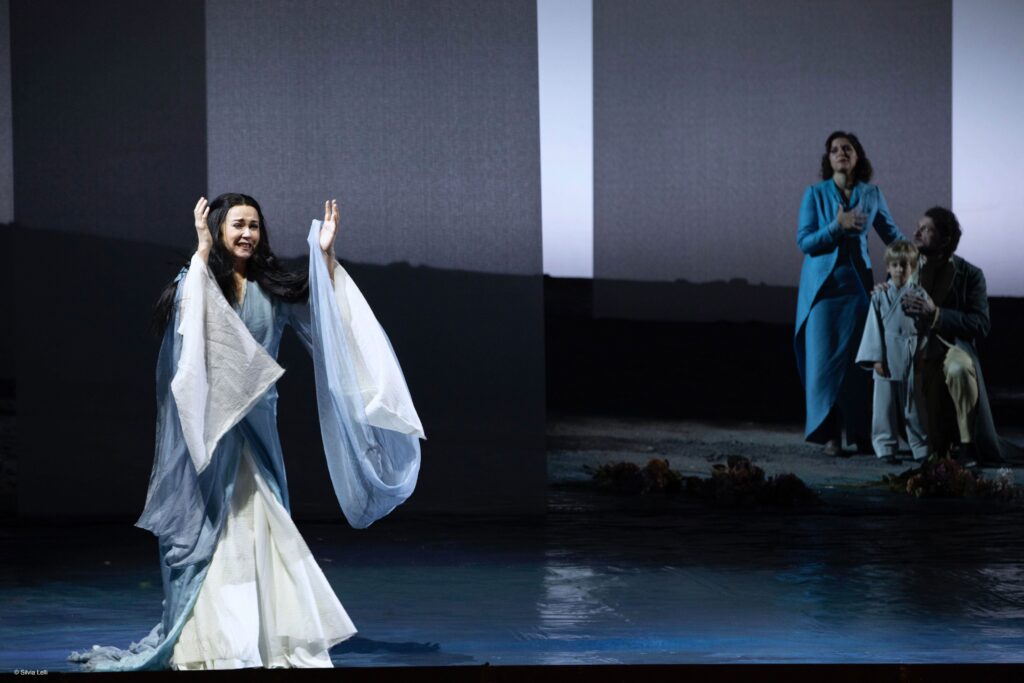
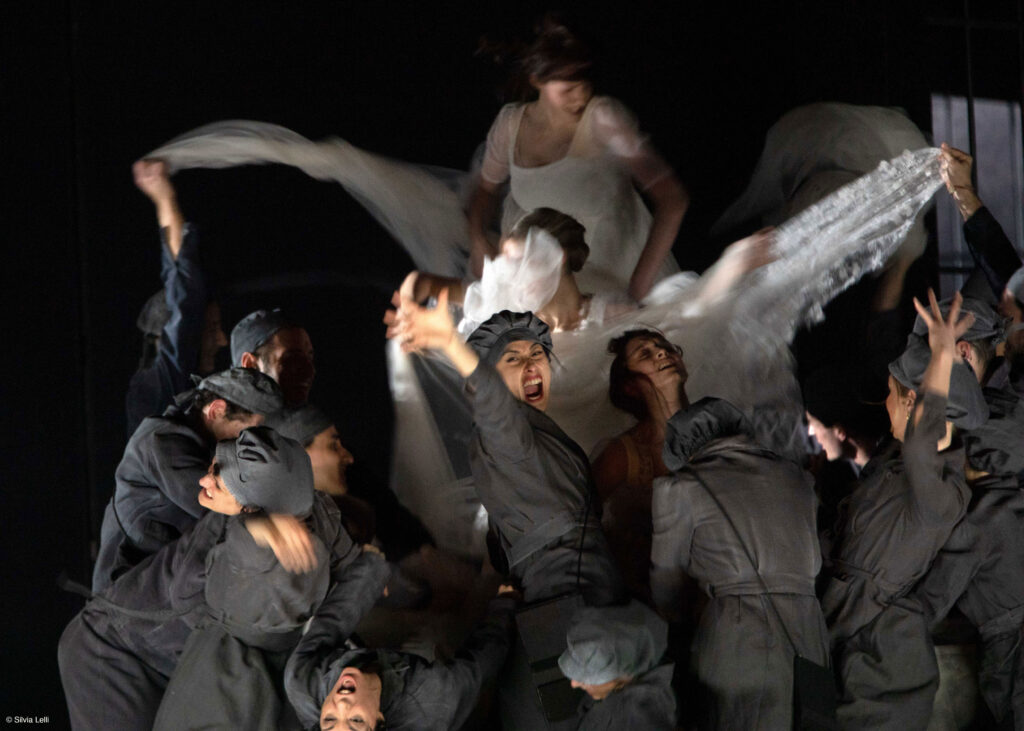
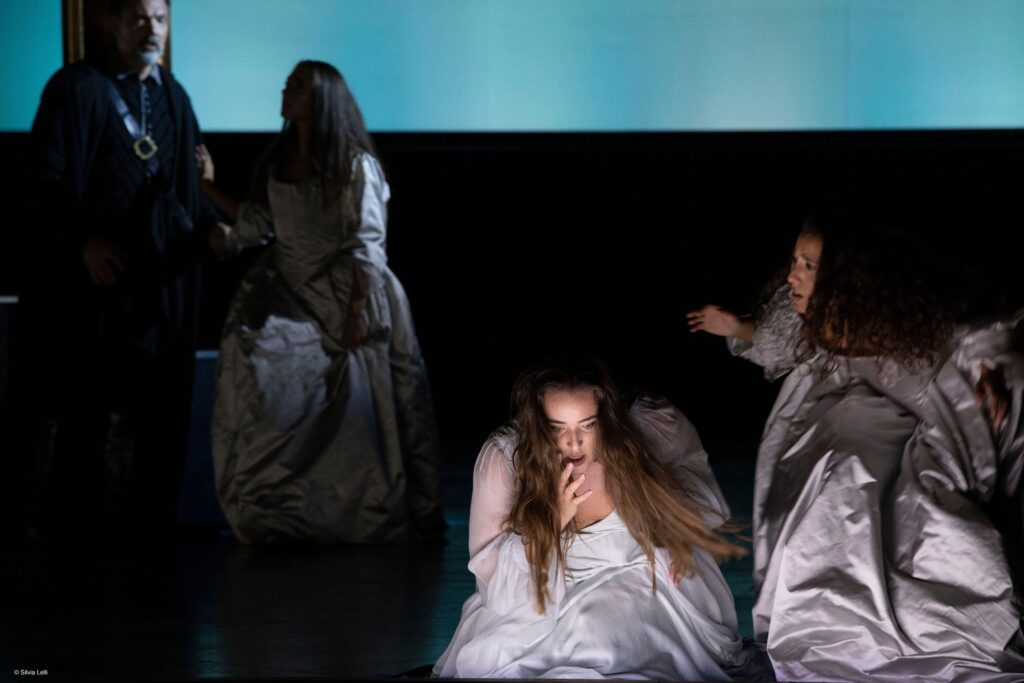
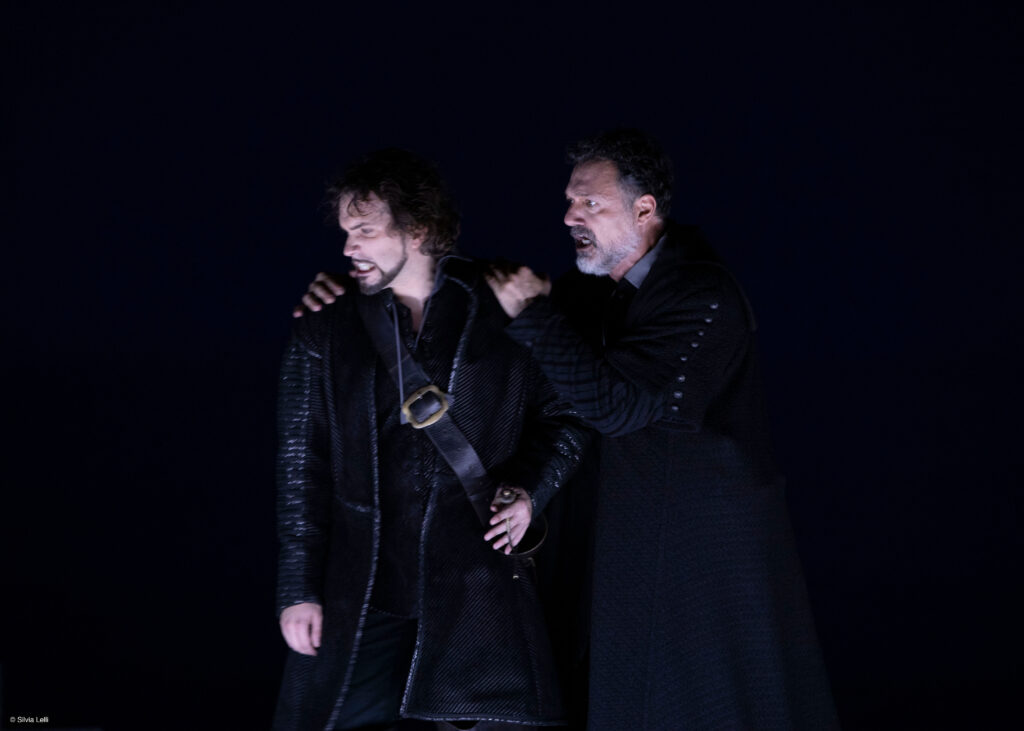
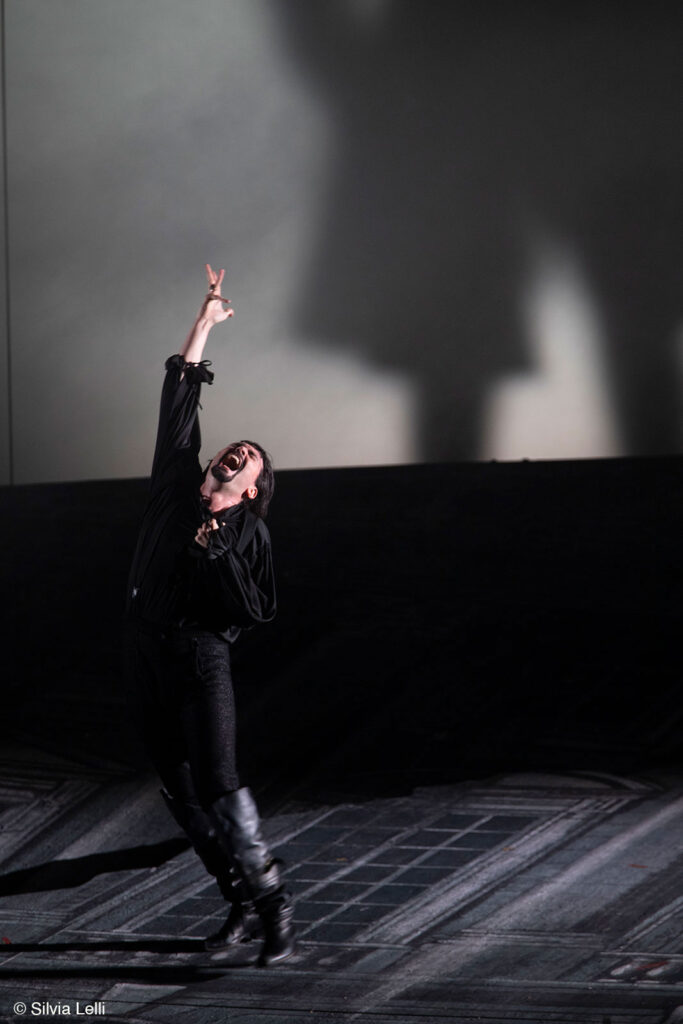
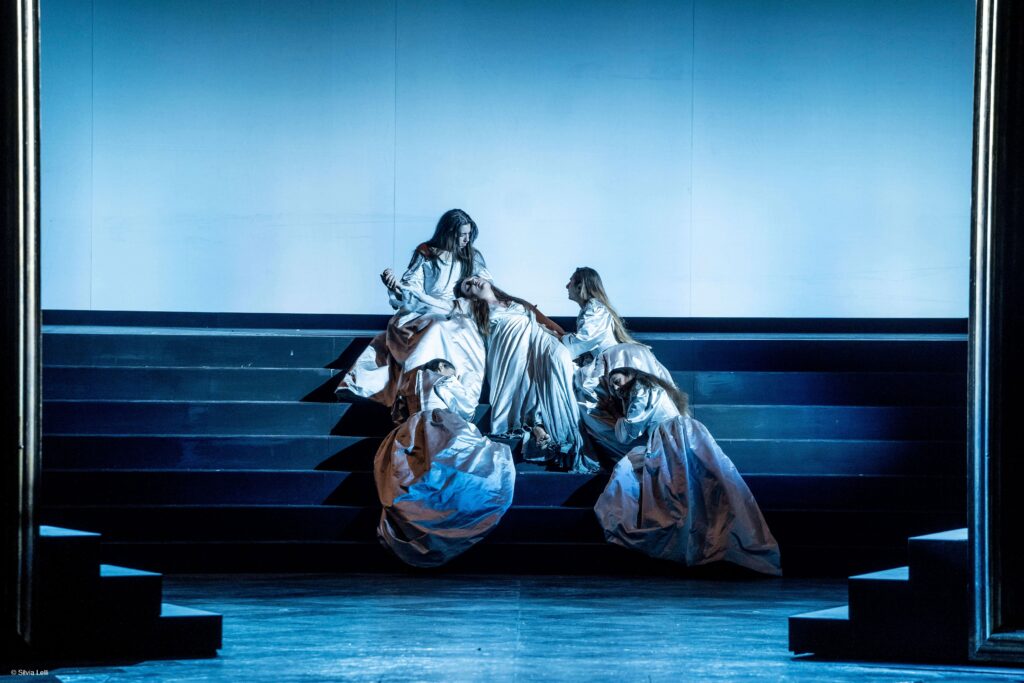
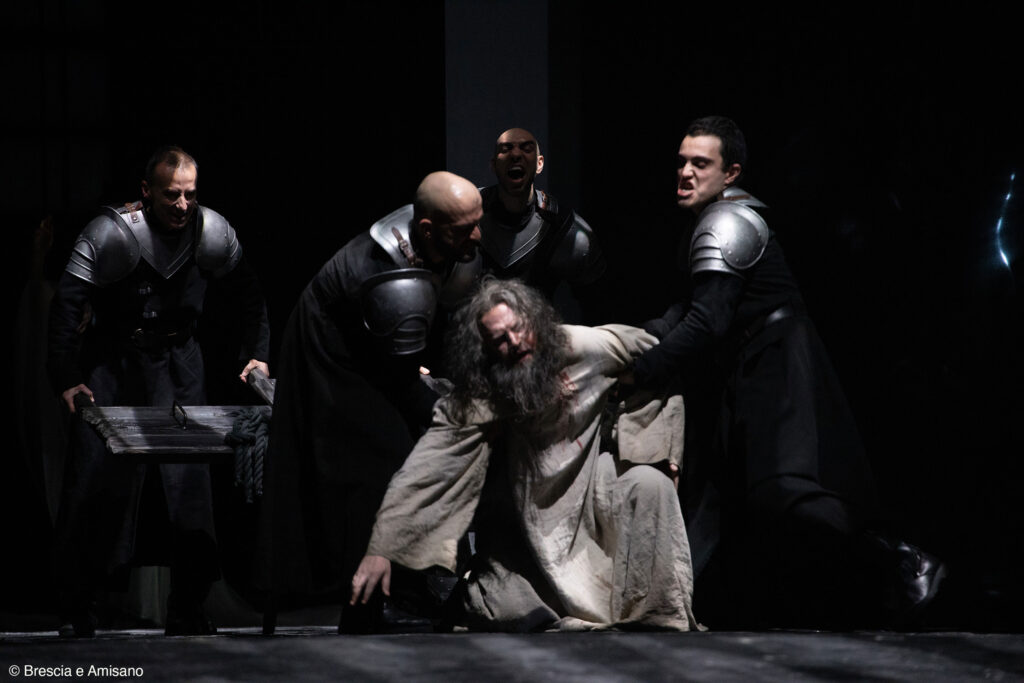
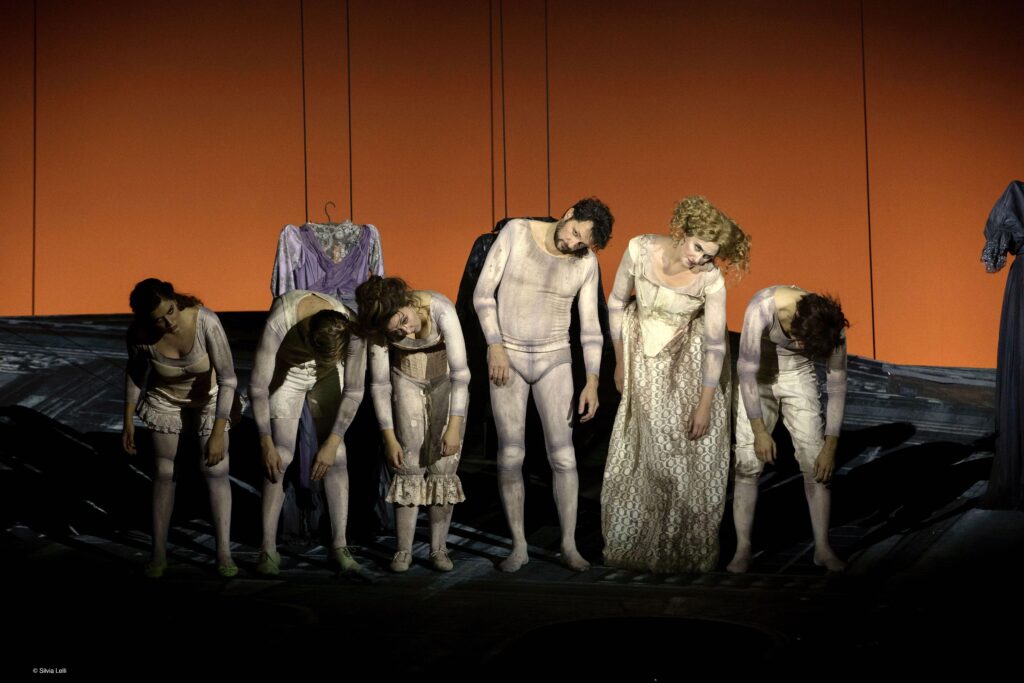
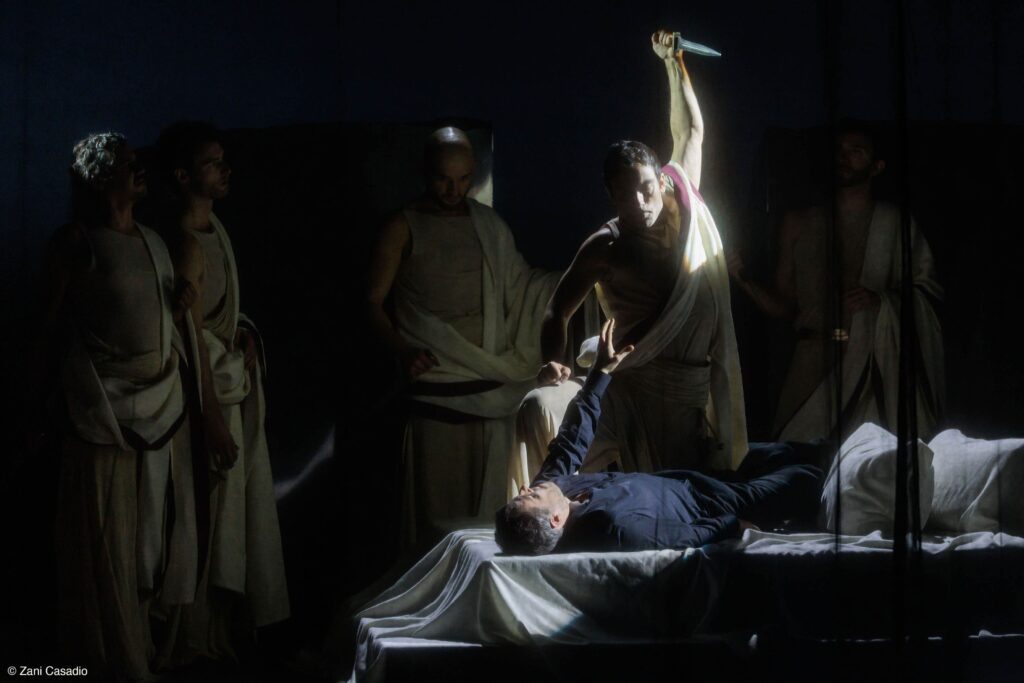
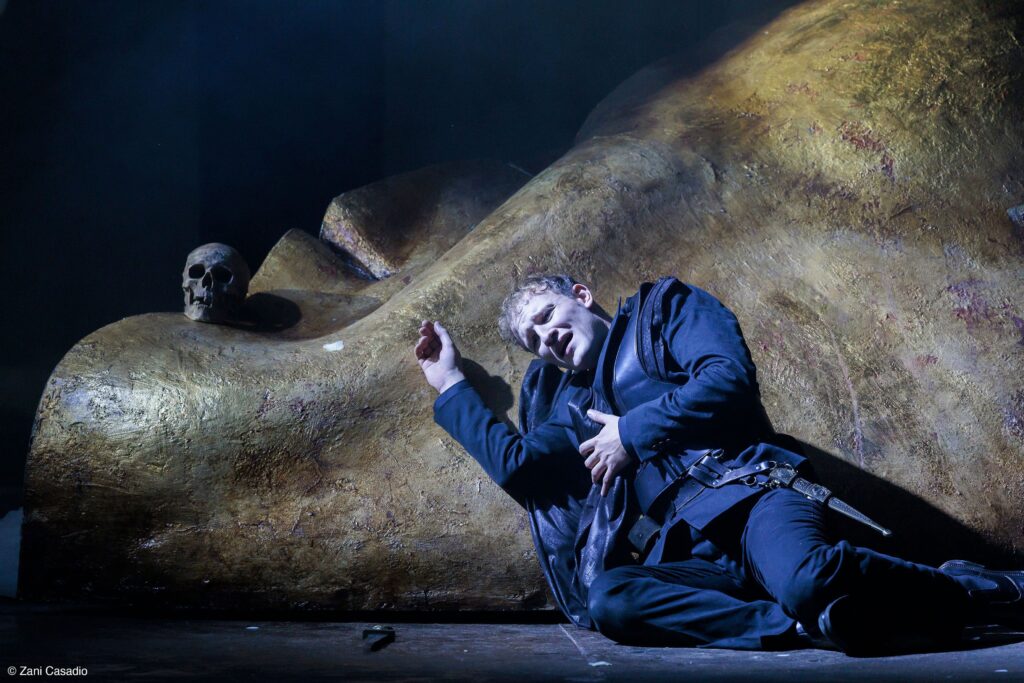
The audience
Our work lies in sharing… A theater without an audience is like an answer to a question never asked. In the sad days of the pandemic, we felt orphaned because we were deprived of the “Why”… Theater finds the meaning of all its restless pursuit of perfection in giving to others that for which it has fought. Theater is a metaphor for an altruistic society—not one of domination, but of democracy—and the Greeks knew this well, whose city-states (Poleis) were structured around the Temple, the Agora, and the Theater! Without the anticipation, the tension, the listening, and the warmth of the audience, the miracle of the theater’s expiatory ritual cannot happen, and we find ourselves weak and unmotivated… Melancholy fills the space around us, and the dull sound of emptiness, like a wall, breaks the momentum that connects action to reaction. A silence of Death… a sense of disorientation pervades the hearts… as if the music lacked its first accents, those that precede the prelude of everything… and in theater, these translate into a sort of frivolous and joyful murmur, a source of adrenaline for every theater practitioner, so to speak. And at the end of the show, the absence of applause or dissent—greeting and farewell of the artist—deprives them of comfort or motivation for the evening to come… we find ourselves lost, like a prayer “whose discord wants to fly without wings.” It is a great mistake to believe that theater can be downsized by imprisoning itself within modern technologies… the spectator’s eye must travel freely and be able to roam freely wherever imagination guides its wanderings on stage, without simplistic filters or mediations, depending on the emotions the story arouses in them. No film editing can ever replace that intimate relationship that only the ritual of theater can create—a relationship that speaks from human to human. For this reason, I believe I can affirm with certainty that Theater will never die! On the contrary, it will be a place of Humanity’s Resistance.

Sharing memories, the privilege of a childhood in theater
I grew up in Art, between the red velvet seats of theaters… My first jolt was Bertolt Brecht’s The Threepenny Opera, directed by Giorgio Strehler. I comfortably attended, wrapped in the cotton wool of the maternal liquid, one evening in 1973. On stage, Domenico Modugno fired a gunshot, and my mother felt a jolt! My first stance! It was theater that gave it to me, and, oddly enough, it was the one who would later become my teacher. A few days later, I was born breech… I’ve always said that, deep down, I never wanted to face reality head-on but rather recreate it in the play of self interpretation to unmask it! Since then, theater has been my home… my stance… I have never felt safer than when immersed in a theater seat, crouched in the dark, watching the miracle of theater unfold before my captivated eyes… Strehler, Ronconi, Erzog, Enriquez, Vitess, Lievi, Cavani, De Simone, Jobb, Hampe… so many directors… each with a different method, a style, a necessity… the work on the character, the physicality, the makeup, the costume, the character that refines and takes shape! The light that redefines it in chiaroscuro like paintings from other times, and finally the voice and music that give value to what is left unsaid… My first love was at eight years old, Figaro by Samuel Ramey, an American who arrived with Texan boots and whom Strehler transformed, floating around him, into Beaumarchais’ revolutionary servant! And it was the first Miracle I witnessed! Then came Francisco Araiza’s Ferrando in the marvelous “Così fan tutte” by Hampe, at the Salzburg Festival, still shadowed by the titans’ shades. I see myself leaning over from the balcony after the performance, shouting all my enthusiasm to the performers of that Mozartian miracle of perfection, and shouting to the sky in thanks so that Wolfgang could hear me! Ten years old… and the certainty that the dead, when they speak to us from the beyond, like in opera, are more alive than the living around us! Since then, my daily life became boring… my only reason for existence: music and theater… My father gave me my first cassette version of “Così fan tutte”, produced by his then record company, the legendary Emi, with a dedication that I carry in my heart… “To Chiara, who at ten knows this masterpiece by Mozart so well, with the greatest wish that she may always rejoice in true and deep affections, in life and in family, today, tomorrow, and always.”
Those cassettes speak to me of a time whose enchantment still works today, just as it did then… when theater calls me to my responsibilities as an interpreter… but back then… the responsibilities were those of school. My playmates became the wooden heads of the puppets from my maternal grandfather’s collection in his house in Ravenna. A dentist and puppeteer by vocation, that silent multitude hung on the walls of my father’s studio, was my first audience. The silence of those faces is full of the vital energy each of them spent to convince the audiences of the children of the late 1800s in the piazzas that they deserved to exist! Behind those seemingly fixed gazes lie the noisy enthusiasm of a childhood that has flown into eternity. That mystical silence behind which they take refuge was conquered by dancing on the wrists of humans and possessing, once, their eyes and voices… and it will survive us!
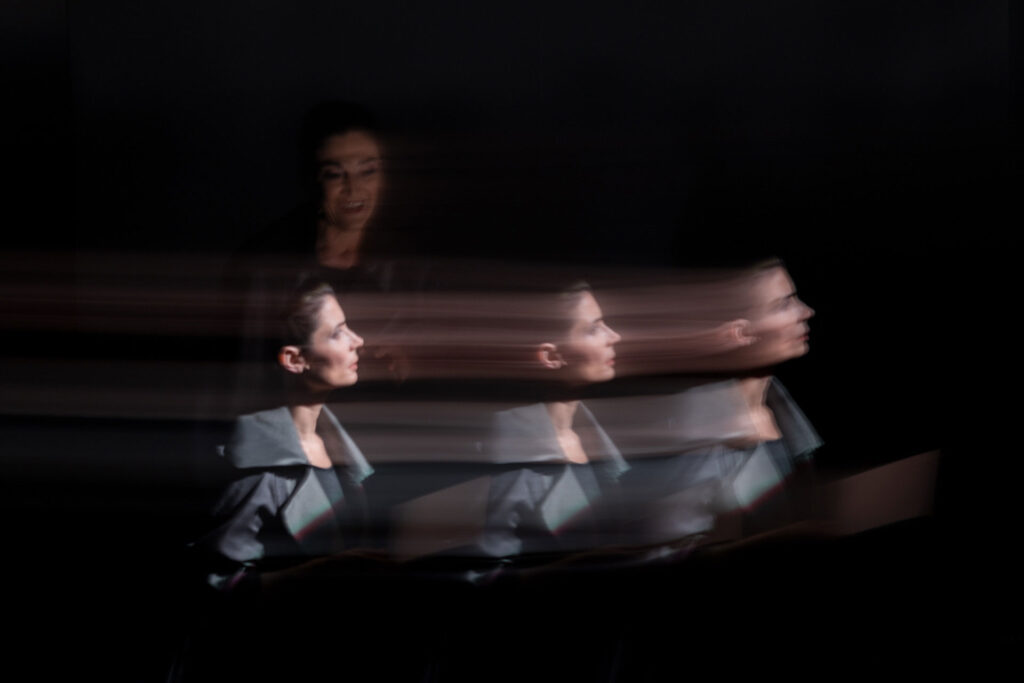
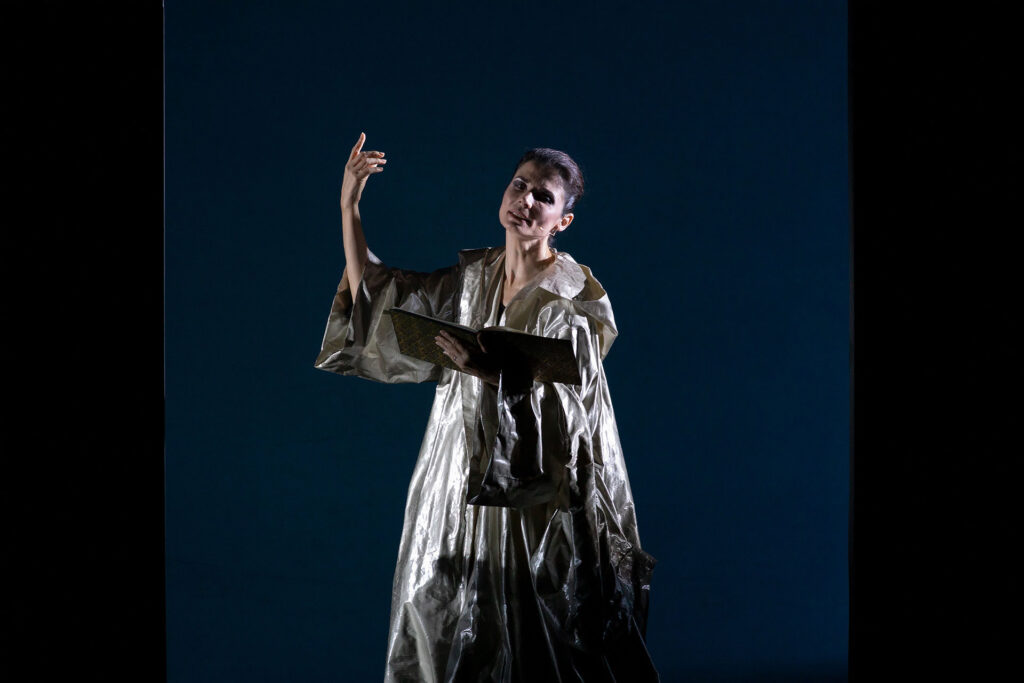
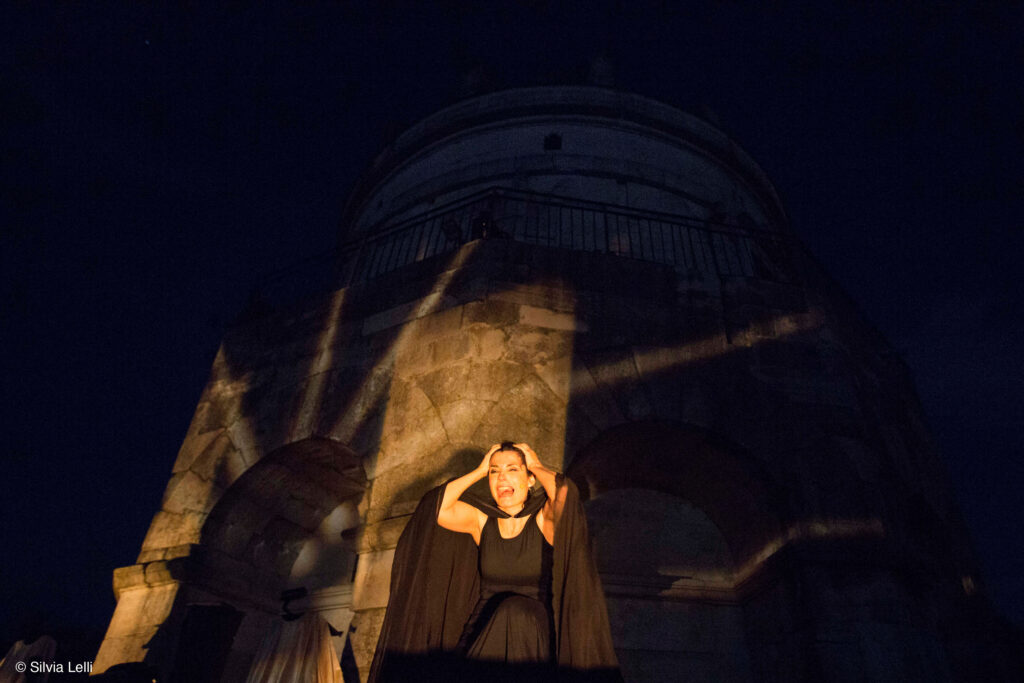
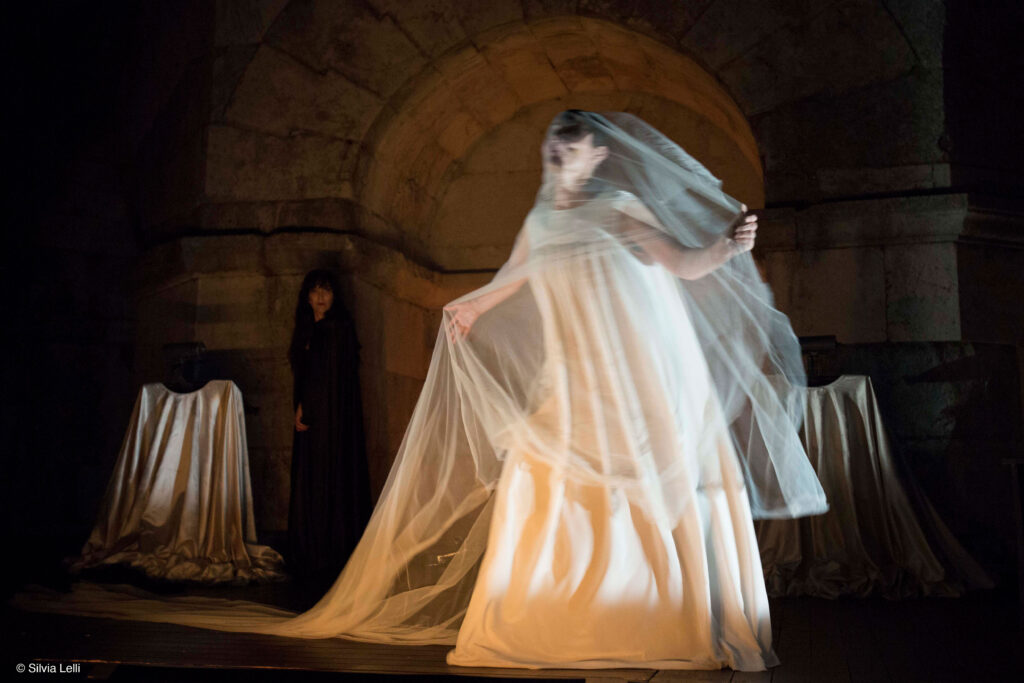
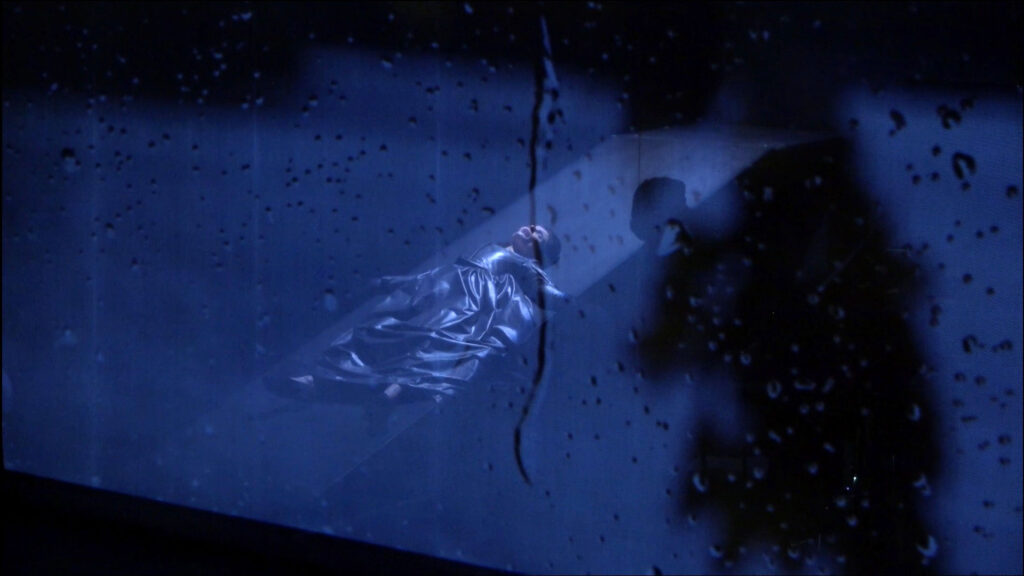
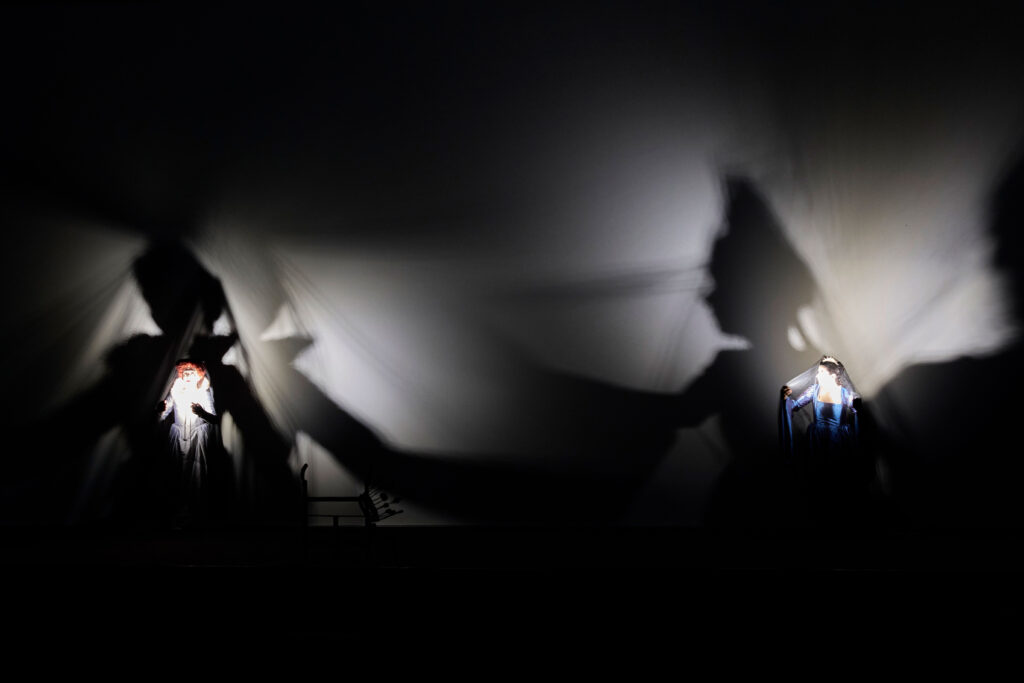
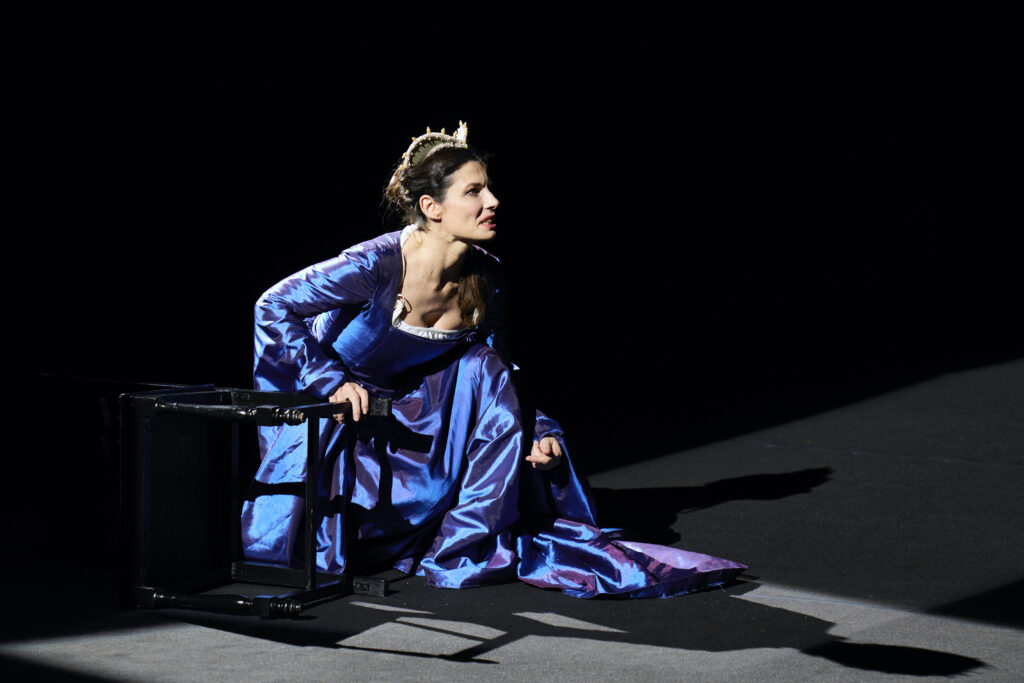
Lost ideal…
The first one, for a director, is a transition… nothing more can be attempted, and everything is completed… you would still like to interact, but you can’t… you suffer in silence with those on stage, mentally anticipating every critical moment, hoping that everything works as it should, everything is now done… before us, that dream, long meditated and nurtured in the depths of our imagination, takes shape, revealing itself in all its “infallibility”… the ideal of perfection that we had aspired to can only take form in the betrayal of oneself… the dream becomes matter, finds its essence in the ephemeral to which it is subject… thus partly abdicating its aspirations… one must learn to let go… the humility of abandonment… then something magical can happen… the performance, slipping beyond our control, enchants and surprises us, making us amazed spectators of our own work, captivating us… only then can the performance be considered successful! In this expulsion from paradise… immersed in the dark, “naked” in front of others, waiting to be perceived, understood by a foreign multitude that surrounds us… waiting to be judged… but the real judgment is from ourselves that we demand it! A judgment without leniency! The theater is a metaphor for life, like a miracle, inspiration seals its birth, life shapes its acts, trial after trial, in an attempt to govern its outcomes, and death decrees its exhalation in which the work, completed, bends to the judgment of posterity. The beauty and mystery of man lies in his ability to clothe his condition of precariousness with hope, the gravity of his substance… The curtain falls on the dusty boards, and tomorrow the stage will welcome new voices and new steps… and it will have new stories to tell others, before and after us… theater is a school of humility, that sacred place where the ritual is carried out, celebrating conflicts and contradictions, greatness and baseness of human nature, and it is for this reason that it tolerates neither censorship nor posthumous reinterpretations that hide times when civilization made mistakes! Theater is the place of catharsis! The sin of Hubris! The most feared by the ancient Greeks because it is a source of oppression… and encroachment on others’ freedoms! Man needs to see himself represented as he is! Without concessions, as in a mirror, to free himself from the evils that corrode him, to accept the heavy substance of his nature and to believe in the eternity of his race… through storytelling… to conquer time, witnessing, through the ancient ritual of interpretation, to be eternal while knowing that we are not.
My Teachers
Giorgio Strehler taught me that Theater is a vocation! To be masters, one must be servants… that is, only when you learn to serve the Opera can you truly master it! For Strehler, the word is music and music is word… recitatives are only a matter of timing… the hours spent at the Piccolo Teatro mastering the art of the mask of the Commedia dell’Arte comedians, carried on by the great Harlequin of Ferruccio Soleri, was one of his greatest teachings. Humility and sacrifice! And a mask to cover the sweat on a brow enslaved to a character… the Ego erased in service to the eternal Pantalone or Brighella, Colombina or Zanni… The personality of the individual placed at the service of a collective harmony, in sharp contrast to rampant individualism! Theater as a school of listening and communion! When I auditioned to enter the Paolo Grassi Drama School in Milan, I was eighteen. I remember that at the first audition, I performed the great recitative of Donna Anna from Mozart’s Don Giovanni… when in the interview they asked why I had chosen an opera recitative unaccompanied, which was quite unusual, I replied: “I have a good teacher who trains me… Mozart and Da Ponte…” Everyone laughed, and I was joyfully admitted. But behind that phrase lies the truth of my approach to theater. For me, theater is deeply connected to music. Rhythm, phrasing, and colors are the foundation of everything, and the Italian language is the queen! The vowels in recitatives can, by brightening or darkening, illuminate the word with intentions and magic… the great singers of the past were masters of this! Their words were understandable from the farthest seats in the gallery! Today singers tend to favor volume at the expense of colors… and often the five vowels of the Italian language become a single monotonous muffled vowel that makes words unintelligible, stripping them of charm and meaning! Every language has its strengths… as a lover of great playwrights… Dante in French, Molière in English, and Shakespeare in Hungarian… certainly much of the rhythm, phrasing, and colors of the original is lost… It is an immense privilege to work in Opera! Where no translation is needed. Music elevates language by escaping the laws of comprehension and translation, entering the realm of intelligibility! Because music does not explain! Music evokes! Valeria Moriconi was a master of this, whom I consider my Great Teacher of theater. Her apparently natural acting came from meticulous rigor; she taught me to chew the text, ingest it, and digest it in order to literally inhabit it as one flesh. A theatrical animal! But how much study… she used to say: “For hours, for days, I read and reread the lines of the script thousands of times… when I possess it completely, I move on to calibrate the voice in relation to the character’s psychology, using the voice like a violin whose tuning fork is the soul and the bow is moved by the intelligence on the score of the text.” And she added that theater is not just words but “gesture, voice, educated body, mood, a choice of life.” In this sense, Stanislavski was an innovator! And it was to him that the course I was admitted to after three auditions— the last one before the great Strehler at the Piccolo Teatro di Milano—was dedicated. I performed Nina from Chekhov’s The Seagull. I remember suddenly Giorgio jumped on stage and began acting alongside me… I felt outside myself, inhabited by an “other” energy that ended with his enthusiastic cry of approval… he invited me to lose myself… to speak beyond myself, to pierce through myself… to let go with trust… but to do so one must be aware of throwing oneself into the arms of a Titan… and this is the curse of those who begin theater with such high hopes… My path is paved with wonderful encounters… among which I would like to remember the creative exuberance of Micha Van Hoecke who taught me to plant my feet on the ground while looking up at the sky… above all, the disarming and noisy smile of Valeria Moriconi, whose panther-like gaze seems to pierce me even today, now and then, when I am about to go on stage… the untamable creature of De Filippo and Enriquez, who was one of the greatest actresses in the history of our theater, searching for her daughter for Marivaux’s comedy “La Mère Confidente.” I presented myself, stepped on stage, performing “Elvira” from Molière’s Don Giovanni… I began… and the silence was broken by my voice which at first struggled to believe itself… sounding sincere before those who know you are not pretending, both wanting to believe it… the dilemma of disenchantment in theater… then I believed it so much that, railing against the ghost of Don Giovanni I thought I glimpsed in the dark of the hall, emotion overwhelmed me, and memory played that blankness that so frightens actors… I did not lose heart and searched within myself… the silence became a dialogue between me and Valeria… she did not interrupt, and I acted as if it could last an eternity… at that moment I felt I had touched her… and she said to me “You’re good, child, I saw it when you searched, with disarming sincerity, for the character that had abandoned you for a moment.” How much I learned with Valeria… instinct and reason, warm heart and cold mind, restrained gestures, vibrant silences, prolonged pauses, rasping sonorities of the voice… and above all immense respect for the work! The great school of theater accompanied me from the beginning… and I want what I have learned to be passed down to new generations.
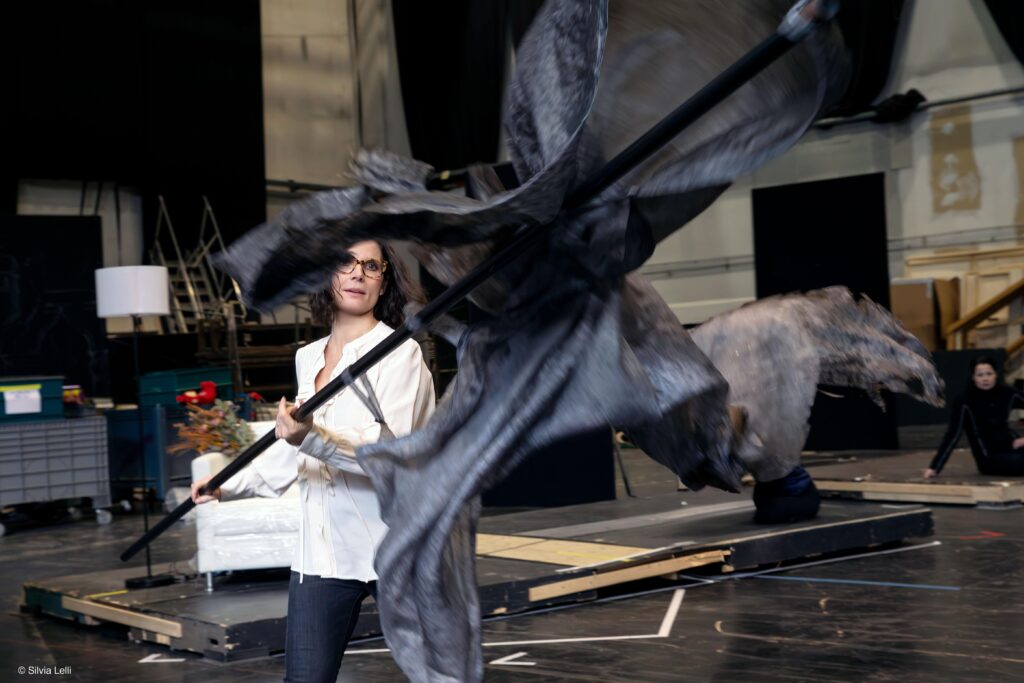
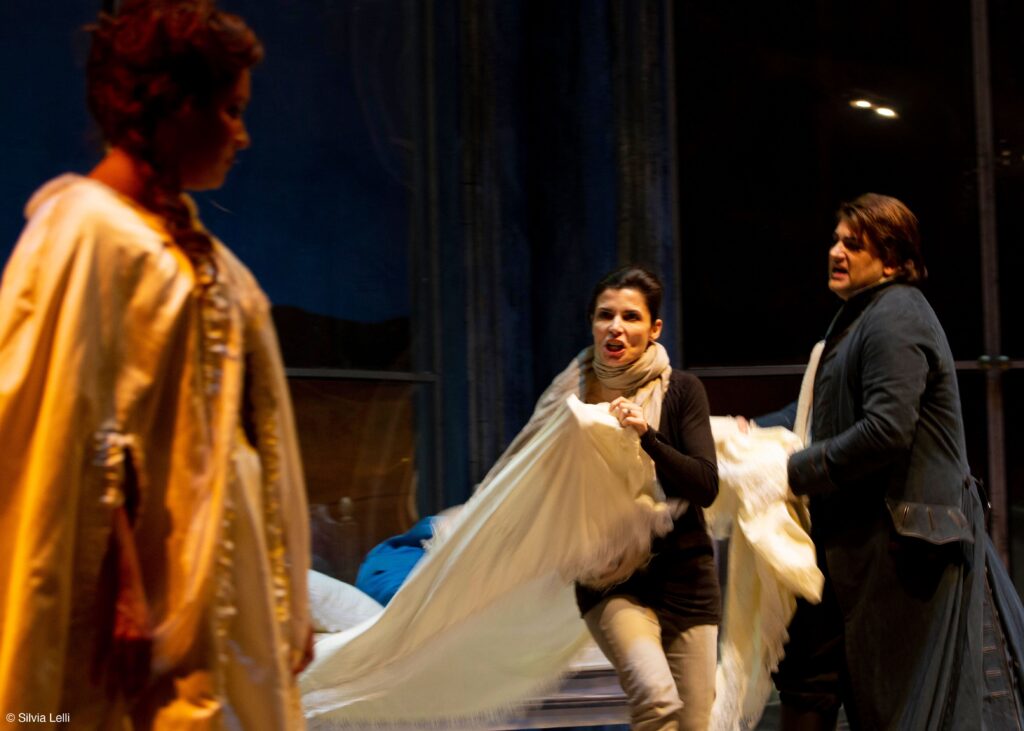
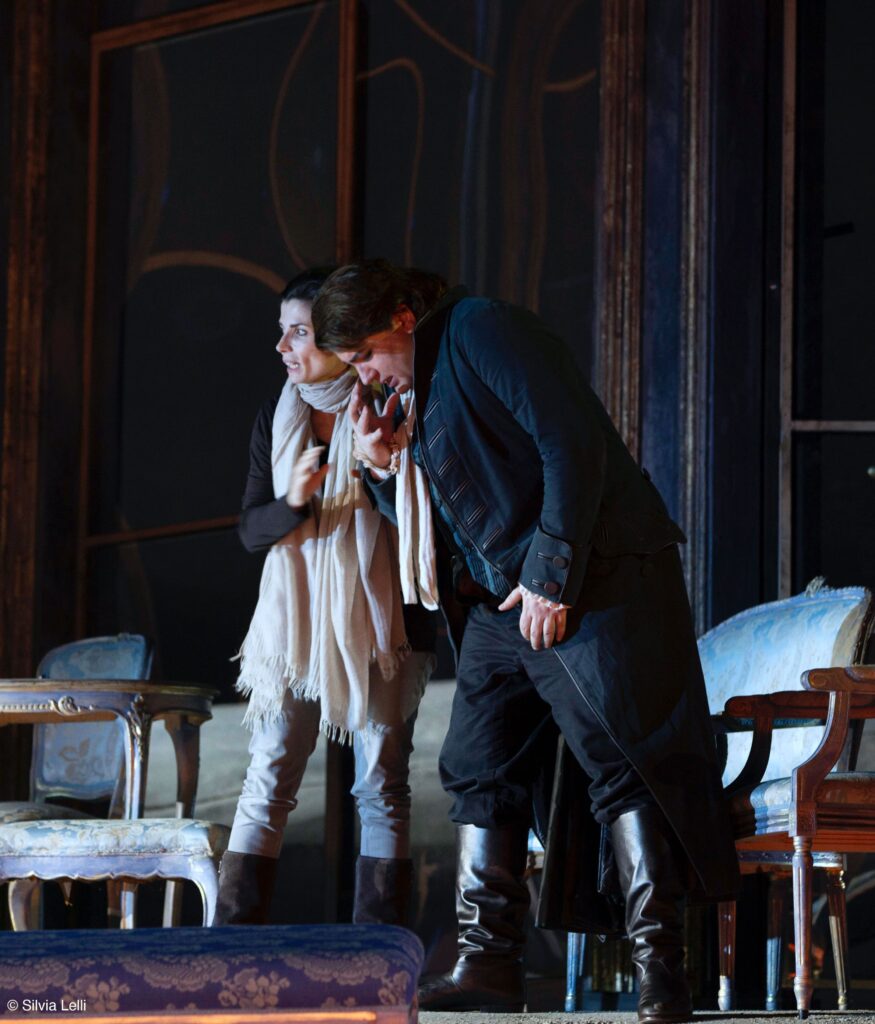
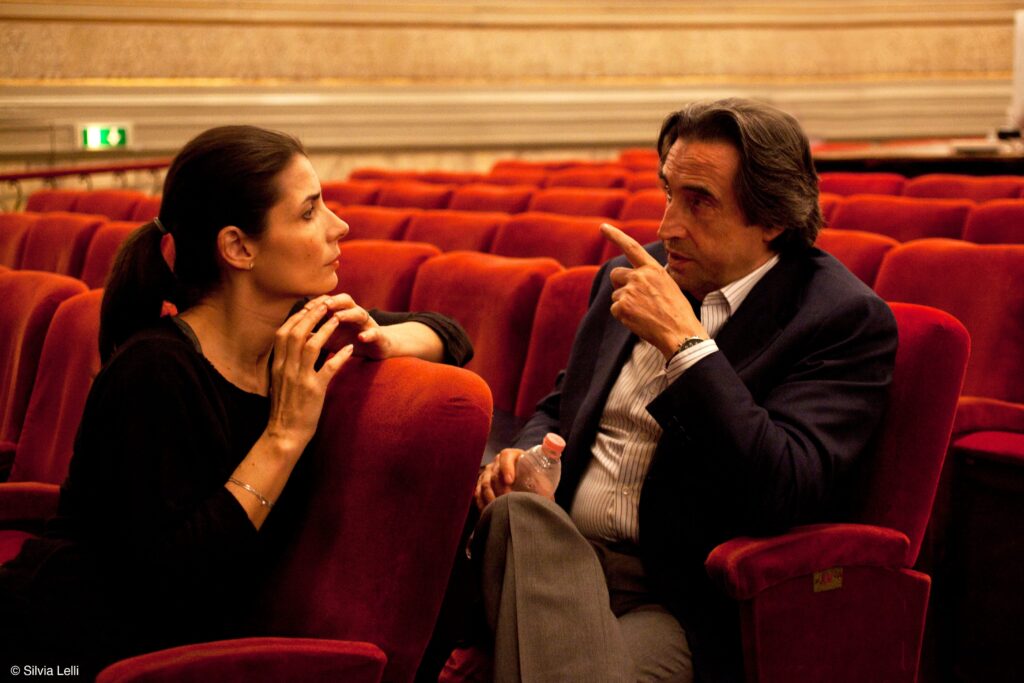
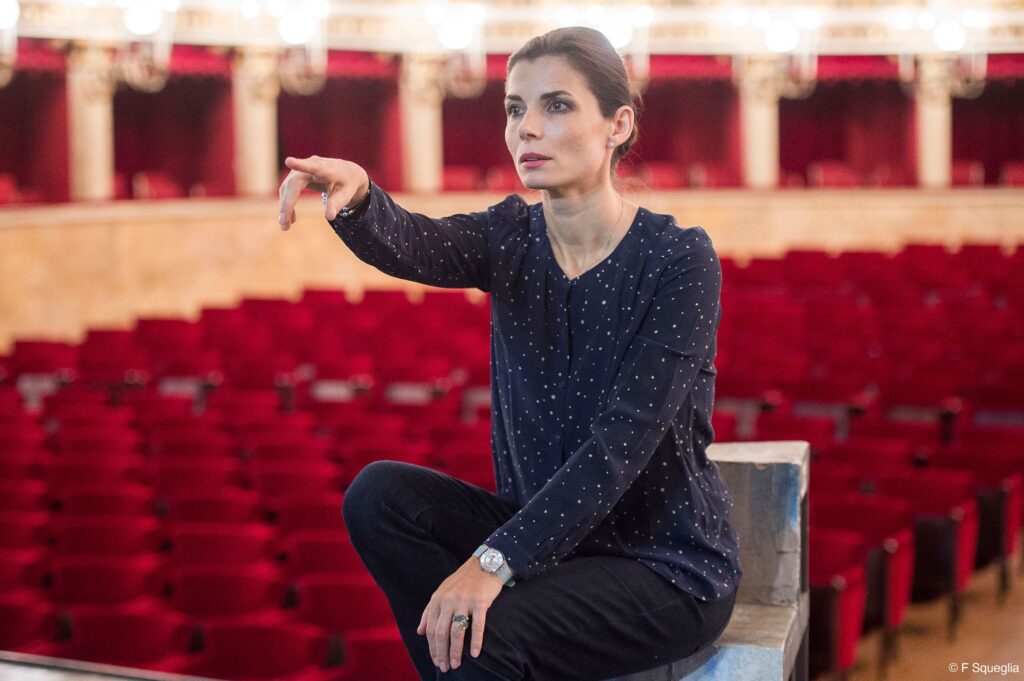

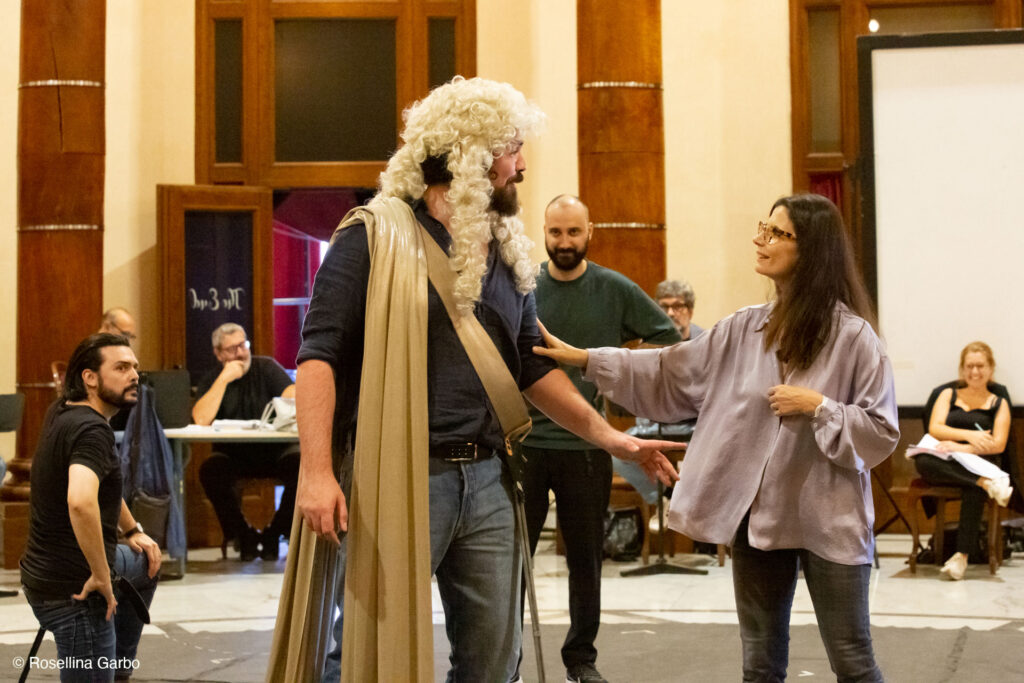
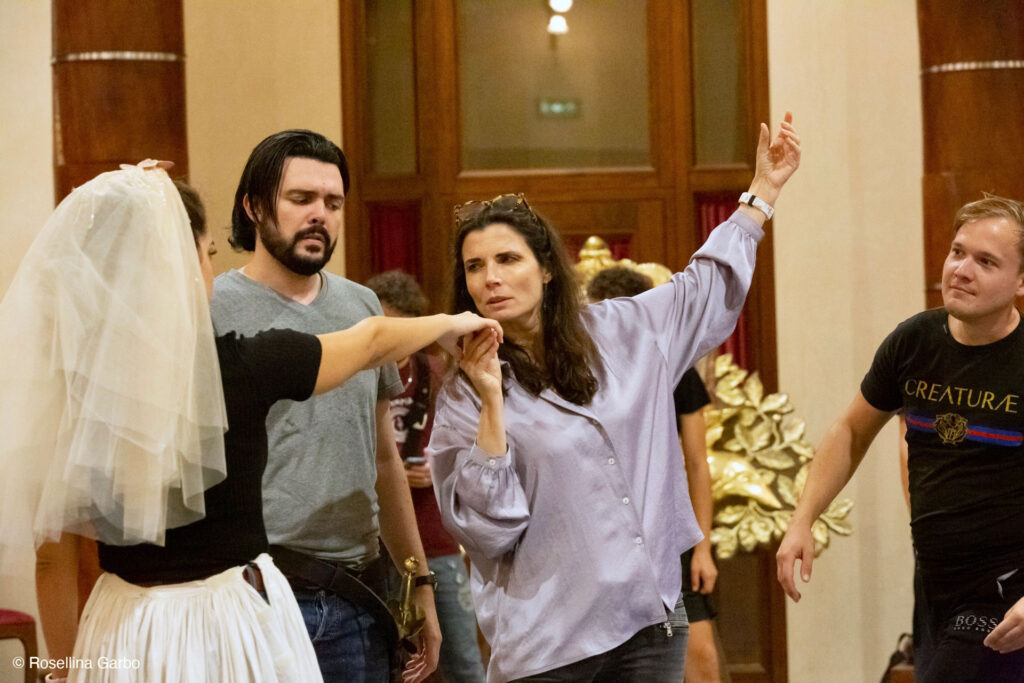
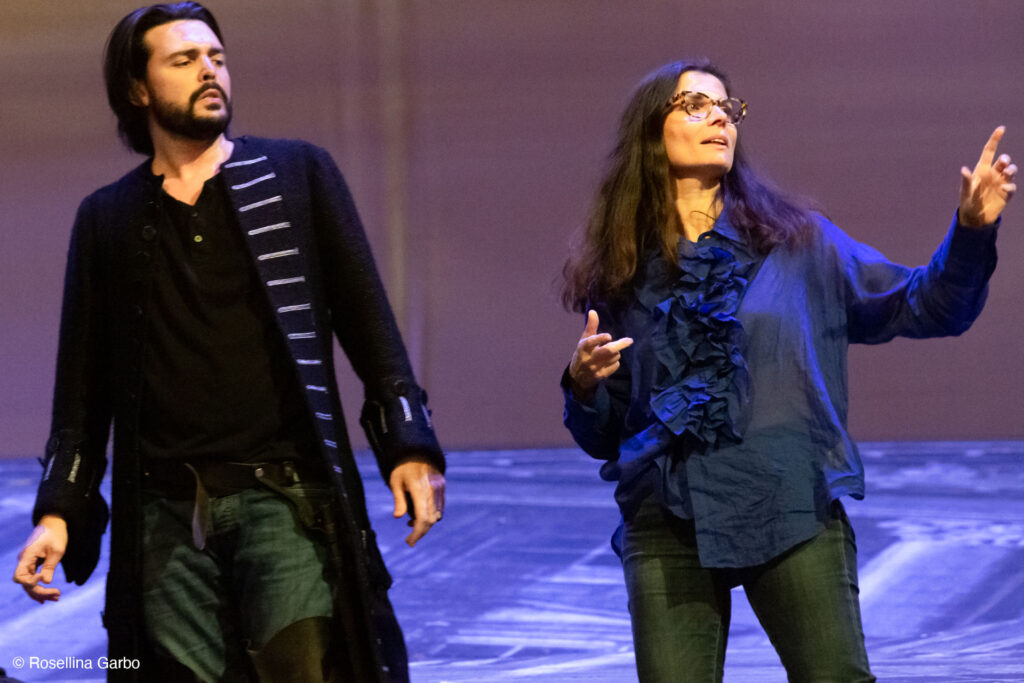
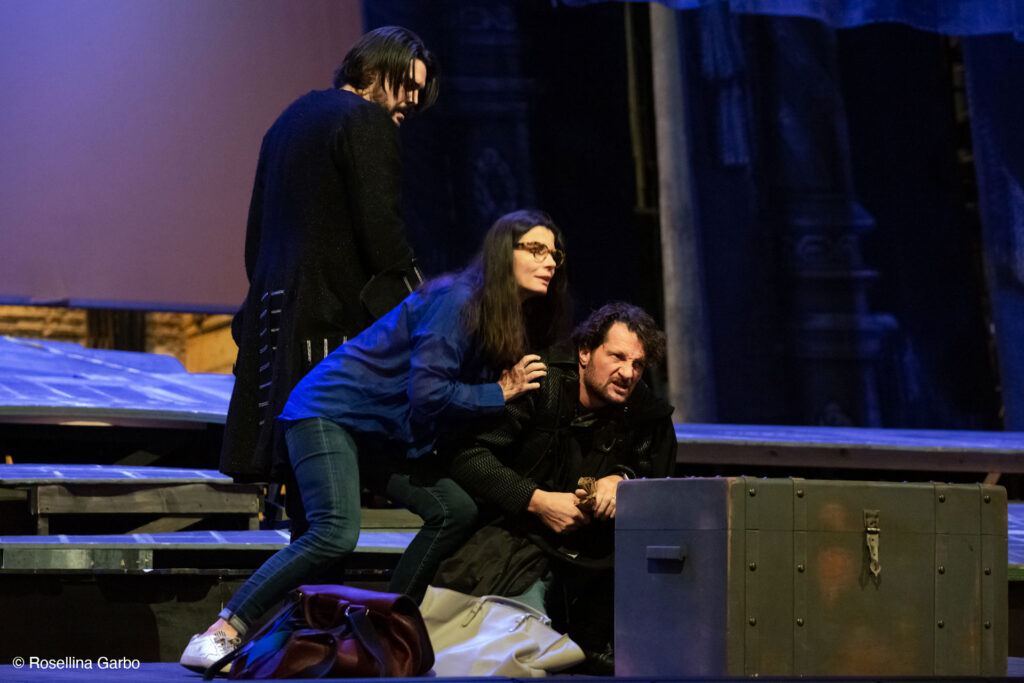
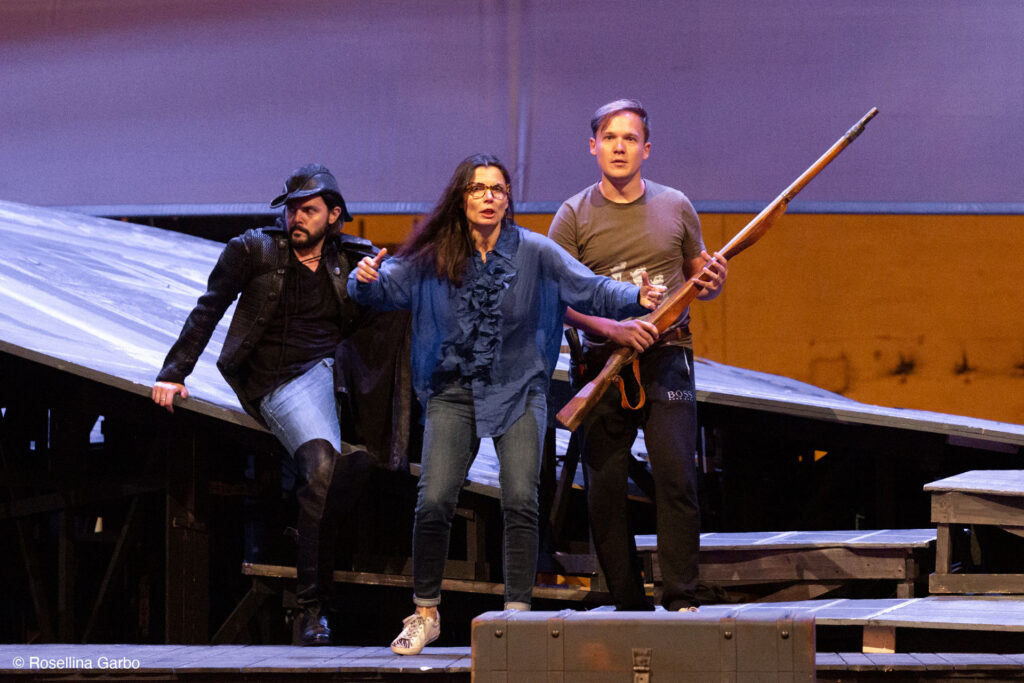
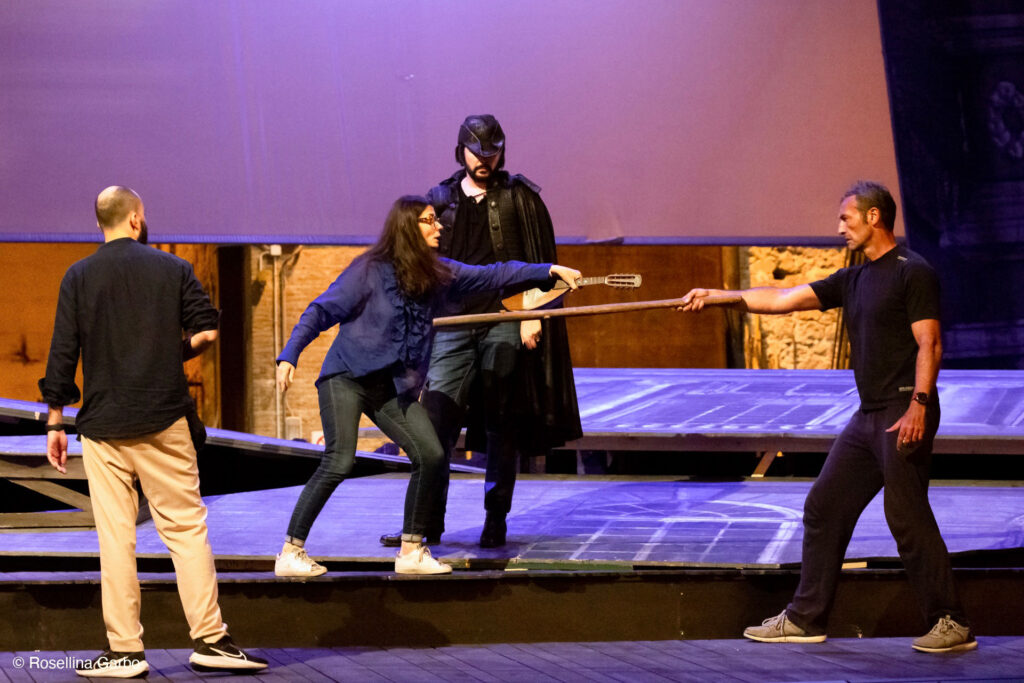
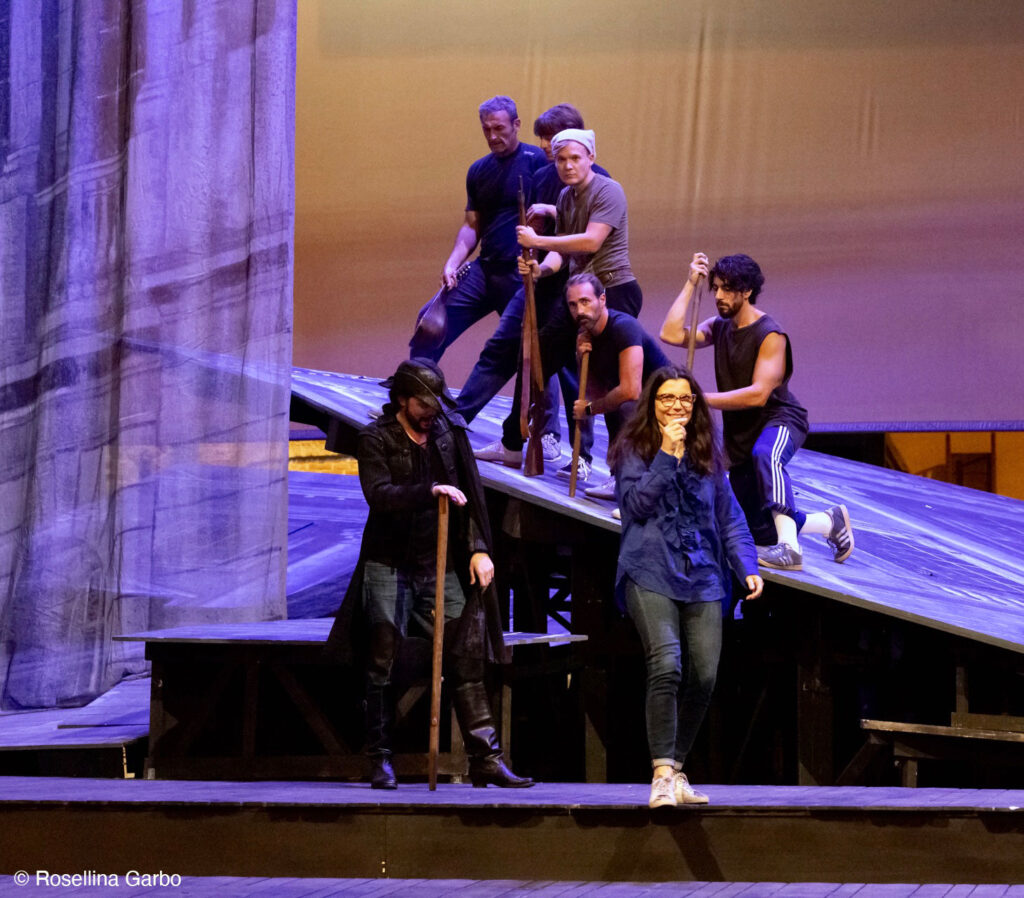
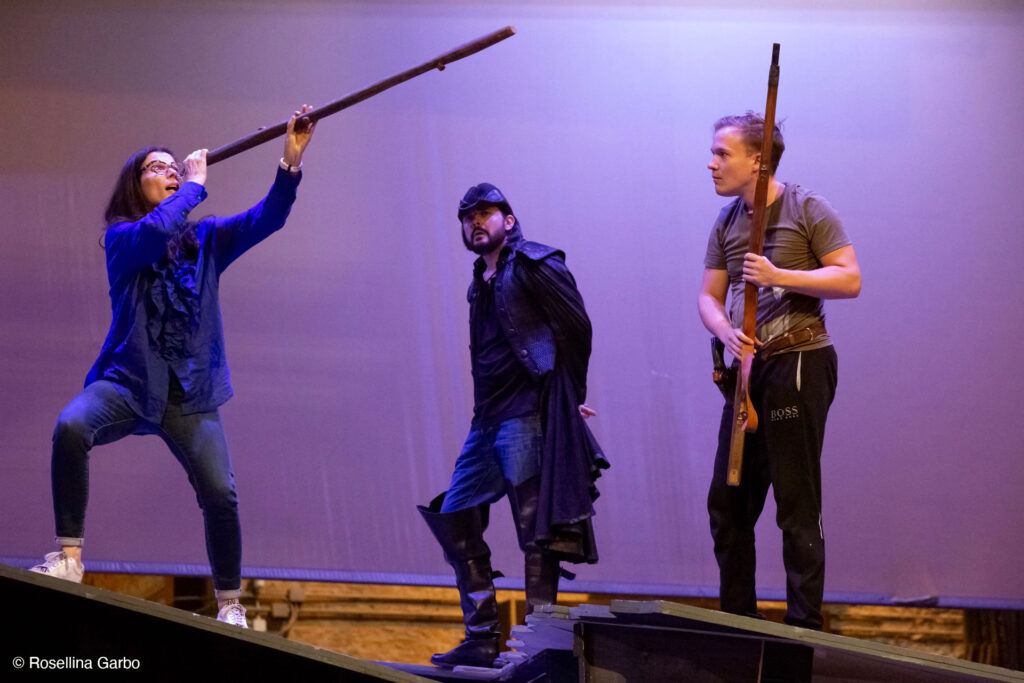
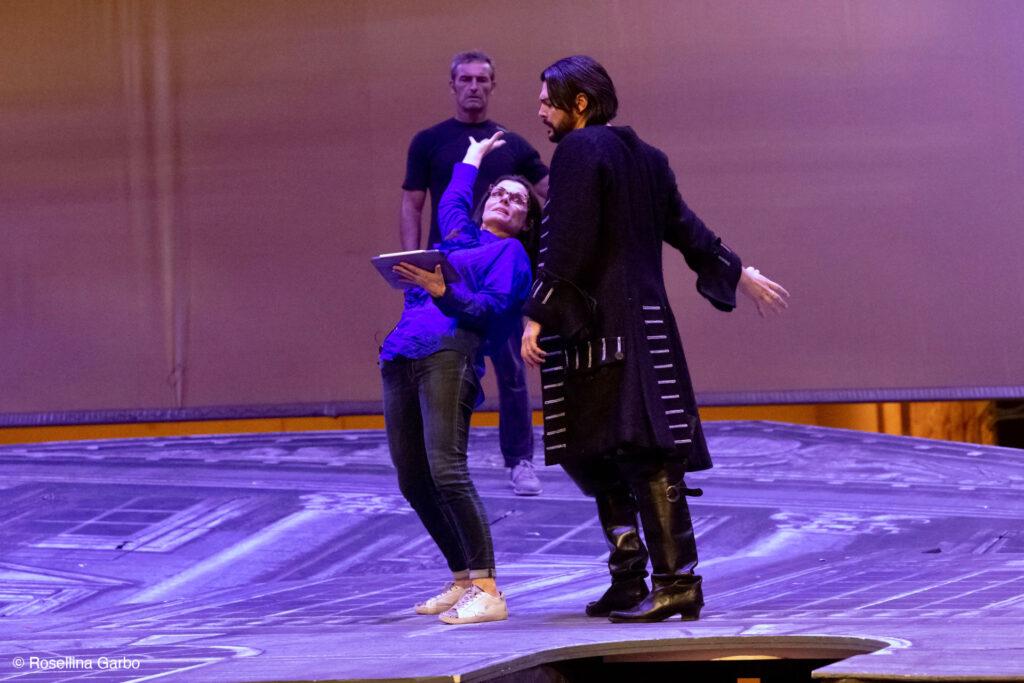
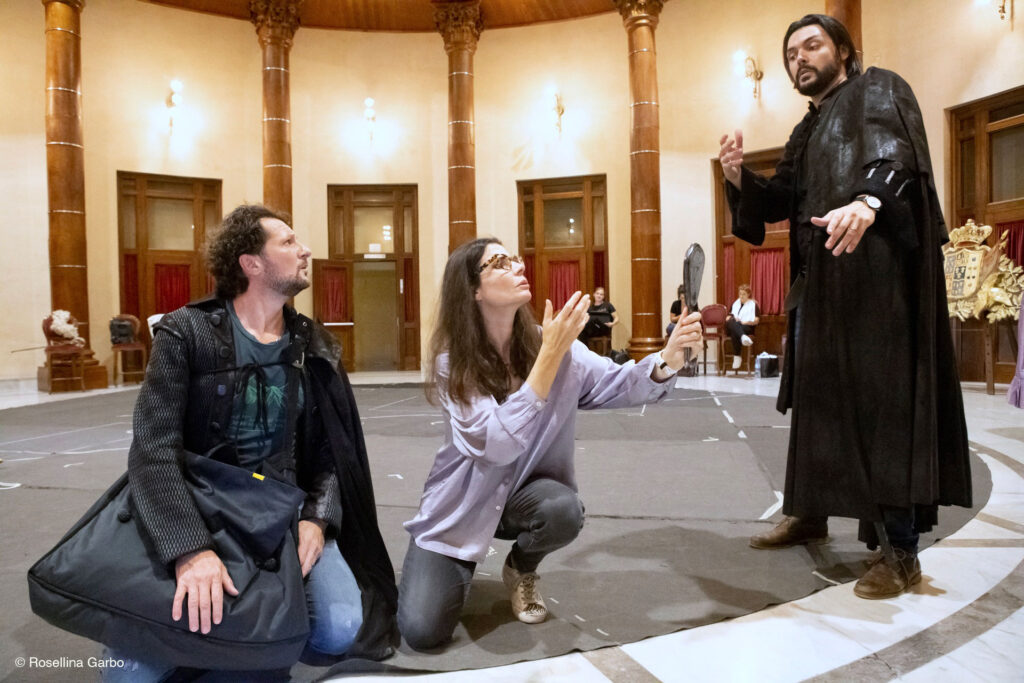
Magic of the whole
The magic of theater works when you least expect it… often a moment we had idealized as magical on paper turns out to be trivial or fleeting, while what we thought would be fleeting suddenly shines with immense beauty… just like life! The best encounters happen by chance! But it’s a chance you must know how to seek! In this sense, Theater is a metaphor for life! It must be done with people who share the same work ethic, in order to grow together, knowing that we must always be ready to put ourselves back in the game, as if it were the first time, and always with the same determination and care, no matter the place or the importance of the venue! Theater is collaboration! It is done together! I hold dearly to the privileged relationship I have with my collaborators, a relationship that must, first and foremost, be human! Based on friendship, mutual respect, and listening! Set design, lighting, and costumes are not just aesthetic support but carry full meaning in a shared message to be conveyed to the audience. The primary idea, imagined in the solitude of my search for musical listening and understanding of the historical and social context of the story, is then nourished by the imagination of artists who share the same ideal of theater! That is, an ideal in which one puts themselves at the service of the Opera! An ideal of beauty, understood as aesthetic purity and the form of storytelling aimed at transmitting a shared concept to defend and elevate. First, there is dialogue with the set design… when the directorial needs are defined and the scenic horizon is traced, one then relies on chiaroscuro! Light is fundamental for me! It traces the path in space, guides the gaze to the nature of close-ups and the whole… modeling them with inner essence! Costumes then seal the images, defining eras and lines that can, in a well-combined mix of cuts and colors, convey the form of the content! That darkness in the auditorium, before the curtain rises, is a prayer! For the Greeks, it was the Catharsis… a reflection on who we are and who we want to be or become. Everything is possible… Medea, Agamemnon, Prometheus, Antigone, Oedipus, Phaedra… they are the… solitary giants shouting to us from the deep roots of the archetype of the elusive nature of our self… theater speaks to us about ourselves… it tells us who we are and who we could be… and by openly lying, it brings out the truth! It is an eternal ritual that, by convention, escapes the modernization of the World. Theater is a serious matter! A true worship of human nature. It disappears with us and is reborn with us… the unstable nature of things reminds us that, as Prospero says in The Tempest by Shakespeare: “We are such stuff as dreams are made on…”
